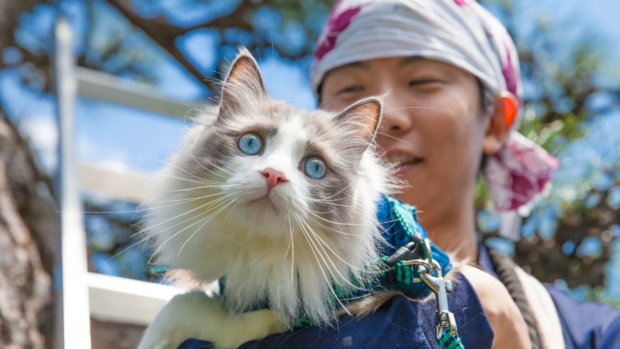Thai report on cat-to-human COVID-19 infection captures global attention
BANGKOK — The first cat-to-human transmission of Covid-19 was documented in a Prince of Songkla University study and published in the June 6 edition of the US Centers for Disease Control and Prevention’s Emerging Infectious Diseases Journal.
The report was brought to global attention by the New York Times four days later.
The study recounted the case of a father and son in Bangkok developing symptoms and testing positive for Covid-19 on August 4, 2021. Due to a shortage of hospital beds in Bangkok, the two men were taken to a hospital in Songkhla on August 8. The father and son brought their pet cat along on the 20-hour ambulance ride to Songkhla.
After the men were admitted to the hospital, the cat was taken to a veterinary hospital for tests. Though the cat appeared healthy, the 32-year-old veterinarian collected nasal and rectal samples, which tested positive for Covid-19.
While the vet was swabbing the cat’s nose, the animal sneezed. Though she was wearing gloves and a mask during the swabbing, she did not have a face shield to protect her eyes.
Article continues after this advertisementOn August 13, the veterinarian developed symptoms, including fever and cough, and shortly after she tested positive for Covid-19.
Article continues after this advertisementGenomic sequencing revealed that the cat’s owners, the cat and the veterinarian were all infected with the same version of the Delta variant, which was different from viral samples taken from other patients in Songkhla at the time.
PCR testing suggests that the cat had a high viral load at the time of its veterinary exam. None of the veterinarian’s close contacts had Covid-19 at the time, and she had no prior encounters with the pet’s owners, which supports the theory that the cat was behind the vet’s infection.
Thai researchers said this was the first documented case of cat-to-human transmission, though it is very rare as cats have a very short viral shedding period of around five days.
Meanwhile, the New York Times quoted Dr Scott Weese, an infectious diseases expert at Canada’s University of Guelph, as saying: “Cats are far more likely to catch the virus from people than to transmit it to them, scientists say. But the case is a reminder that people who are infected with the virus should take precautions around their pets — and that veterinarians and shelter workers who may come into contact with infected animals should do the same.”
RELATED STORIES
Pets and COVID-19: What owners need to know
Pathogens jumping to humans from animals becoming more frequent, warns WHO
Thousands in Hong Kong volunteer to adopt hamsters amid COVID-19 fears
Indonesia animal-lovers help pets left behind by coronavirus
For more news about the novel coronavirus click here.
What you need to know about Coronavirus.
For more information on COVID-19, call the DOH Hotline: (02) 86517800 local 1149/1150.
The Inquirer Foundation supports our healthcare frontliners and is still accepting cash donations to be deposited at Banco de Oro (BDO) current account #007960018860 or donate through PayMaya using this link.
